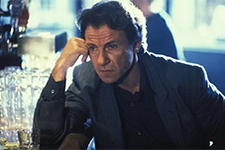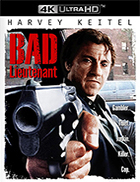Bad Lieutenant (4K UHD)
|  It had been more than 20 years since I last watched Abel Ferrara’s searing, unflinching psychodrama Bad Lieutenant primarily because, despite its undeniable power and cinematic brilliance, it is a hard film to watch. Endure is probably a better word to describe the experience of getting through it, which might sound like harsh criticism, but is actually laudatory because that is the very point of the film. It is a terribly, deeply unpleasant experience, but how could it be otherwise? How could a film depict this kind of subject matter without being unsettling? Ferrara’s major achievement in Bad Lieutenant is how he makes the film so horrifying without ever seeming contrived or sensationalistic. Other films have dealt with subjects just as harsh, but few have reached its level of raw reality with such unvarnished directness. As the titular unnamed New York City police detective, Harvey Keitel gives one of the best performances of his career, not so much playing as fully embodying the embittered agonies of a haunted man whose life is both tortured and empty. He appears to have a family, but he pays them little to no attention. He is a lapsed Catholic who uses his position on the police force to hide his litany of vices: He gambles compulsively, takes from drug dealers, shoots heroin, participates in orgies, steals money, and sexually exploits a pair of teenage girls he pulls over for a broken tail-light. There is never any explanation for how the Lieutenant came to this low point; the screenplay, credited to actress Zoë Lund (Mrs. 45) and Ferrara, simply presents him as a kind of primal force of nature, a skulking presence on the mean streets of New York, which Ferrara captures with his trademark eye for grit, grim, and sleaze in scenes that take place almost entirely at night (the cinematography is by Ken Kelsch, who also shot Ferrara’s feature debut, 1979’s notorious The Driller Killer). The limits of the Lieutenant’s own depravity are put into stark relief by a particularly heinous case he investigates in which a nun (Frankie Thorn) is gang-raped and beaten by two young men on the altar of her church. The brutality with which Ferrara depicts the violence is shocking, but it also demonstrates how there are levels of evil to which even the Lieutenant won’t sink. His moral compass may be deeply damaged, but in some instances it still works. This case becomes the dividing line for the Lieutenant and his future. He feels torn, because even he cannot fathom what these two boys have done, and his own flawed, self-interested nature keeps him from understanding how the nun could find it in herself to forgive them. While he pays little attention to most of his work, he pursues this case doggedly, and one wonders if finding the assailants is not so much for the nun’s sake as for his own. His twisted idea that redemption lies in his enacting violent justice on the nun’s behalf offers a stark rebuke to all the Death Wish-inspired vigilante fantasies of the previous two decades (which Ferrara had also done back in 1981 with his feminist rape-revenge thriller Mrs. 45). Violence just begets more violence. The most powerful scene in the film is also the most unexpected. After trying and failing to get the nun to tell him more information so he can track down her attackers, the Lieutenant breaks down in anguish and has a vision in which he sees Christ standing before him in the church. But, instead of bowing in reverence, he hurls insults and blasphemies, crying in desperation and asking where was God when all these terrible things were happening? But then he snaps, realizing that he is just as much a part of the world’s evil as anyone else, and he begins crying to be forgiven, a modern version of Christ’s parable about the thief on the street corner tearing his clothes and beating his chest, begging God’s forgiveness. The scene is played with only two cameras and no noise save Keitel’s pained voice, and the impact is astonishing. Although it sounds like that scene is out of place in Bad Lieutenant, it is not. In fact, it fits perfectly with the film’s themes of sin and forgiveness, which fundamentally undercut arguments that it is nihilistic. Granted, it structured as an unrelenting downward spiral, and the repetition with which the Lieutenant goes about his various sins is exhausting in its mercilessness. Yet, as a deeply felt portrayal of a man at war with himself, the film suggests that redemption is possible for even the worst sinners, and nothing could be less nihilistic than that.
Copyright © 2024 James Kendrick Thoughts? E-mail James Kendrick All images copyright © Kino Lorber | |||||||||||||||||||||||||||||
Overall Rating: 


 (4)
(4)


